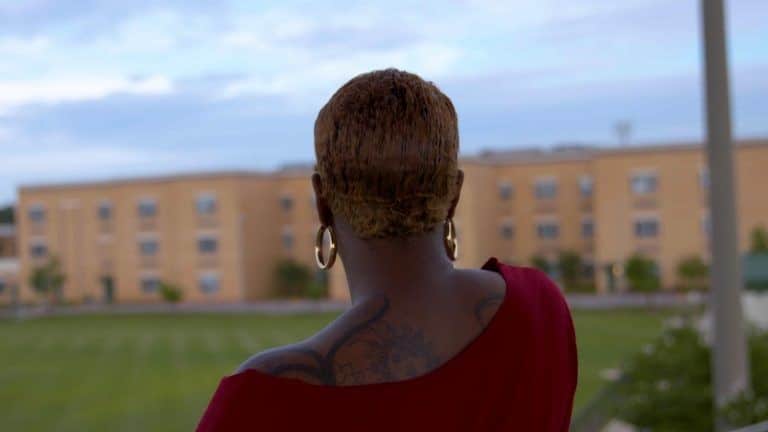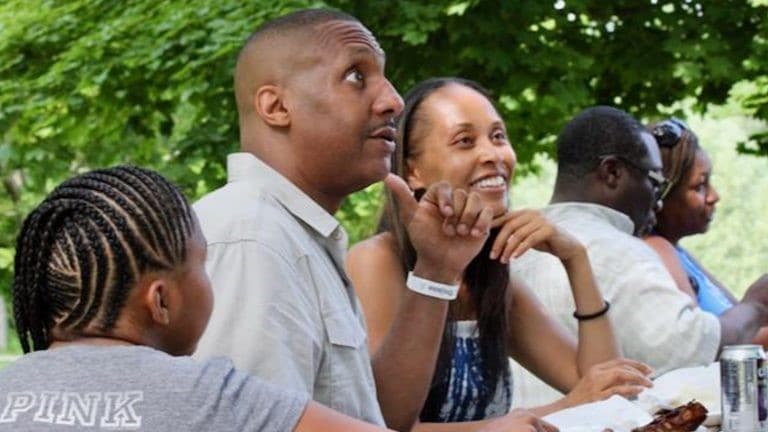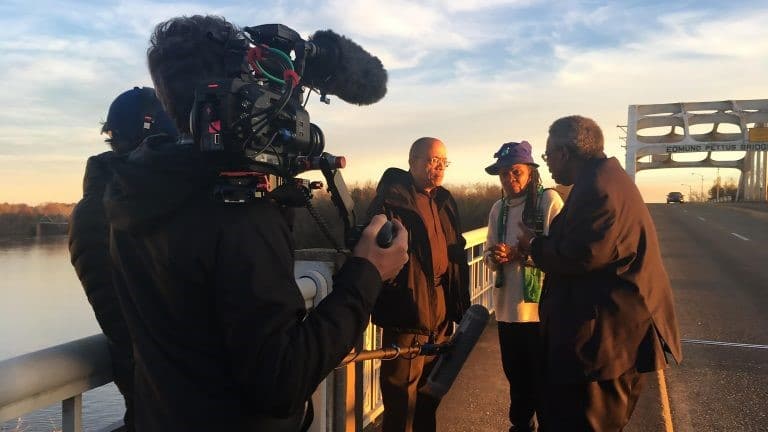Black issues are front and center, from reckonings with racist violence to broader discussions of the history of America’s prejudice.
(This dispatch is part of our coverage of the 2021 SXSW Film Festival.)
Over the past several years, more and more stories of violence and oppressive tactics committed against Black people have come through both in the national and local media. In response, an influx of Black filmmakers and artists have created works recently which directly confront the history of racism to an unfortunate conclusion that not much has changed even after all these years.
Narratives like Steve McQueen’s Small Axe anthology to documentaries like Ezra Edelman’s OJ: Made in America and Garrett Bradley’s Time to hybrid experiments like Ephraim Asili’s The Inheritance or Khalik Allah’s Black Mother have helped to fill the artistic, radical gap in confronting race issues in America that the mainstream industry is still scared to face head-on. SXSW’s slate of documentaries this year aren’t holding their tongues either, with three different engaging perspectives on the history and current reality of Black lives in America.

There are two seemingly irreconcilable sides to America’s view of authority and law and both of these come clashing together in Garrett Zevgetis’s Spring Valley. Centered on a viral cell-phone recording of a School Resource Officer (SRO) named Ben Fields assaulting a Black student named Shakara the documentary makes the case that Fields’s decisions were not isolated or in the vacuum of the moment, but a culmination of a system and history of racism that reinforced and made him feel safe to assault a Black girl.
Activist Vivian Anderson, geographer Janae Davis, and culture critic Robin DiAngelo provide contextual commentary and on-the-ground organizing and research to tie the incident to a greater understanding of race relations in America. This is par for the course of such a documentary, but what stands out is the filmmaker’s approach is to give Fields ample air-time to share his side of the story. This is a dangerous approach of course but Fields makes it successful by betraying himself at every opportunity. He uses familiar talking points about individual choice, a belief that racism “isn’t a big deal anymore” and whenever he is presented with facts, he says that it’s “ok to disagree.”
The documentary is also not afraid to showcase the incongruities between progressive-minded people and communities throughout America. Vivian Anderson experiences culture shock coming down to South Carolina from her home in New York City. The rhetoric of the ‘experts’ in the film gets to be uber-academic at times, but that provides an illustration of the ways activism, education, and outreach need to be fluid and flexible depending on where it is happening in America.

Cultural differences exist not only geographically and across racial lines, but even within the Black community itself, as depicted in Brad Lichtenstein‘s When Claude Got Shot. Continuing with the themes of systemic machinery that lead to inequality and social discord in Black communities, a legal battle ensues between Milwaukee residents Claude Motley, a married family man, and a 15-year-old boy named Nathan King who shot him during a botched carjacking. In the ensuing court case, a significant number of questions and moral crossroads arise, the chief among them being: when the justice system is involved, why is it always Black people who suffer?
The setting of Milwaukee, one of the most racially segregated cities in America, is potent ground for speaking about economic and social issues that lead to violence. As Nathan is facing being tried as an adult at just 15, Claude is racked with medical bills and financial bankruptcy in paying for his surgeries after the shooting. The movie takes its time navigating through the dilemmas of how personal choice vs. systemic oppression remains at loggerheads in determining the future of Black men.
The court scenes are difficult to watch, mainly because a white judge conveniently and comfortably mulls the decision on whether to deliver swift and harsh punishment to one Black kid on the behalf of a Black man who asks for leniency in the ruling. When Claude Got Shot manages a difficult balancing act of recognizing the need for consequences while still confronting the reality that “justice” in America is just another word for “revenge”.

Revenge is something American history is consumed by, especially in the case of white supremacy’s consistent fight to keep minorities in constant subjugation. In Emily and Sarah Kunstler’s lecture-documentary Who We Are: A Chronicle of Racism in America, we are taken through the framing device of a Juneteenth speech that ACLU director and Memphis-based lawyer Jeffrey Robinson gave at the Town Hall theater in New York.
Intercut with his engaging talk on America’s vast buried history of racial atrocities, is interviews and scenes of him around the nation interviewing museum directors, Black historians, and even one short difficult talk with a Confederate flag defender at a protest.
The most easily accessible and large-scoped of all the documentaries, Who We Are is for people who may be getting their feet wet in the discussion on race and history of America. Robinson is clearly speaking to an audience of varied races and creeds and adjusts his talking points to make the information as comprehensive as possible without blunting its impact or piercing through the heart of race issues.
One refreshing thing is that he does not display the ‘race pessimism’ that some cultural critics tend to lean on as a means of extracting guilt. Rather, Who We Are is very interested in the facts. When dealing with conservative talking points about what the Civil War was about, Robinson time and again says “don’t take it from me,” but literally looks back at what Presidents, business owners, and Southern land-owners themselves spoke and wrote.
Read next: The Spool's Best New Releases
Streaming guides
The Best Live TV Streaming Services With Free Trial
The praises of live TV streaming services don’t need to be further sung. By now, we all know that compared to clunky, commitment-heavy cable, live TV is cheaper and much easier to manage. But just in case you’re still on the fence about jumping over to the other side, or if you’re just unhappy with ... The Best Live TV Streaming Services With Free Trial
How to Watch Power Book III: Raising Kanan Season 3
Season 3 of the hotly anticipated Power spin-off, Power Book III: Raising Kanan, is arriving on Starz soon, so you know what that means: it’s the ’90s again in The Southside, and we’re back with the Thomas family as they navigate the ins and outs of the criminal underworld they’re helping build. Mekai Curtis is ... How to Watch Power Book III: Raising Kanan Season 3
How to Watch Doctor Who: 60th Anniversary Specials
Ladies and gentlemen, we’re so back! To celebrate Doctor Who’s 60th anniversary, the BBC is producing a three-episode special starring none other than the Tenth/Fourteenth Doctor himself, David Tennant. And to the supreme delight of fans (that would be me, dear reader), the Doctor will be joined by old-time companion Donna Noble (Catherine Tate) and ... How to Watch Doctor Who: 60th Anniversary Specials
Which Netflix Country has Interstellar?
Maybe you’ve just seen Oppenheimer and have the strongest urge to marathon—or more fun yet, rank!—all of Christopher Nolan’s films. Or maybe you’re one of the few who haven’t seen Interstellar yet. If you are, then you should change that immediately; the dystopian epic is one of Nolan’s best, and with that incredible twist in ... Which Netflix Country has Interstellar?
Which Netflix Country Has Each Movie of The Hunger Games?
For whatever reason, The Hunger Games series isn’t available in the same countries around the world. You’ll find the first and second (aka the best) installments in Hong Kong, for instance, but not the third and fourth. It’s a frustrating dilemma, especially if you don’t even have a single entry in your region, which is ... Which Netflix Country Has Each Movie of The Hunger Games?
How to Watch ESPN With A Free Trial
One of the major concerns people have before cutting the cord is potentially losing access to live sports. But the great thing about live TV streaming services is that you never lose that access. Minus the contracts and complications of cable, these streaming services connect you to a host of live channels, including ESPN. So ... How to Watch ESPN With A Free Trial
How to Watch Paramount Network With a Free Trial
To date, Paramount Network has only two original shows on air right now: Yellowstone and Bar Rescue. The network seems to have its hands full with on-demand streaming service Paramount+, which is constantly stacked with a fresh supply of new shows. But Yellowstone and Bar Rescue are so sturdy and expansive that the network doesn’t ... How to Watch Paramount Network With a Free Trial
How to Watch WE TV With a Free Trial
Previously “Women’s Entertainment,” We TV has since rebranded to accurately reflect its name and be a more inclusive lifestyle channel. It’s home to addictive reality gems like Bold and Bougie, Bridezillas, Marriage Boot Camp, and The Untold Stories of Hip Hop. And when it’s not airing original titles, it has on syndicated shows like 9-1-1, ... How to Watch WE TV With a Free Trial
How to Watch Comedy Central With a Free Trial
It’s no coincidence that many of today’s biggest comedians found their footing on Comedy Central: the channel is a bastion of emerging comic talents. It served as a playground for people like Nathan Fielder (Fielder For You), Ilana Glazer and Abbi Jacobson (Broad City), Tim Robinson (Detroiters), and Dave Chappelle (Chappelle’s Show) before they shot ... How to Watch Comedy Central With a Free Trial
How to Watch FX With a Free Trial
You’d be hard-pressed to find a bad show airing on FX. The channel has made a name for itself as a bastion of high-brow TV, along with HBO and AMC. It’s produced shows like Atlanta, Fargo, The Americans, Archer, and more recently, Shogun. But because it’s owned by Disney, it still airs several blockbusters in ... How to Watch FX With a Free Trial
How to Watch TNT Sports With A Free Trial
For many sports fans, TNT is a non-negotiable. It broadcasts NBA, MLB, NHL, college basketball, and All Elite Wrestling matches. And, as a bonus, it also has reruns of shows like Supernatural, Charmed, and NCIS, as well as films like The Avengers, Dune, and Justice League. But while TNT used to be a cable staple, ... How to Watch TNT Sports With A Free Trial